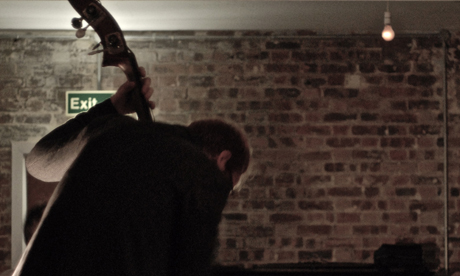Kammer Klang 12 – review

Kammer Klang is a night convened by cellist and RAM graduate Lucy Railton with the aim of exploring the intersection between modern classical and improvised electronic music. Tonight was its twelfth outing.
Five different acts greeted Café Oto’s eclectic crowd. Bassist PA Tremblay fed his 6-string fretless through a laptop, creating a purely electronic soundscape, albeit one controlled with the intuitive ergonomics of a potentially acoustic instrument. Sarah Nicolls continued this exploration of an acoustic interface controlling electric sonorities by playing a piano whilst having MIDI sensors strapped to her wrists. The sound spanned natural acoustic piano to purely abstract dinosaur-in-a-wind-tunnel drones. Instead of getting bogged down in the potentials of such a set up and letting it control her, she crafted what was very digestible music, using at times full arm swings to literally pluck notes out of thin air. Compelling to watch as well as listen to.
Tremblay and Nicolls were to perform together later an ambitious piece likened by the bassist (here solely on electronics) to a bullfight. He saw this as a (rather bleak) metaphor for life: a bull enters the ring, runs about fuelled by adrenaline, then dies. It started with Nicolls beating the piano with everything up to her elbows and ended with her screaming into a microphone. The effect of any intervening bucolic moments was spoilt by the software deciding to take over and do what it wanted. This was maybe not apparent to the audience, but was sufficiently disquieting for the musicians to stop and explain their quandary on two occasions. It was interesting that what was such seemingly instinctual and impulsive music did in fact have an underlying preordained core that could be subverted. Maybe not such a bullfight as WWF SmackDown then? Either way Tremblay superimposed a variety of floating textures on top of Nicolls’ malevolent bass figures, creating something it would be very interesting to hear again without the flow broken.
Before the duet, Leo Chadburn (AKA Simon Bookish) performed a solo recorder piece. He seemed almost naked with just a recorder and no gadgetry. His music was no less captivating though, with his extended technique a good counterpoint to the electronics it was sandwiched between. Even here though computers were never far away: a series of increasingly high pitched squeals gave way to a pre-recorded baroque recorder piece, throughout which he remained silent, before concluding with more manic staccato.
Outhouse were the main act and comprised two saxes, an upright bass and a drum kit. It is hard to assess such a line up without making a comparison with Polar Bear- a band with exactly the same core. For this outing Tremblay’s laptop even augmented their line up much the same as Leafcutter John’s did in his initial Polar Bear gigs. While Polar Bear built abstraction into their sound through Leafcutter, with the saxes playing often very hummable tunes, Outhouse incorporate it from the bottom up in the saxes themselves. Tom Challenger and Robin Fincker traded blows in odd meters using half articulated notes, but weren’t scared to build such fragmented themes into extended solos as well.
In all this was a very good night. Music to really think about that demanded attention but was not too abstruse. Good beer at the bar, a well lit room and an appreciative audience.
